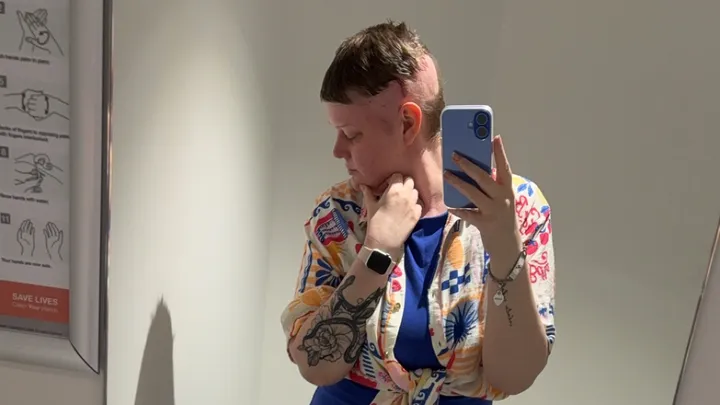I Am 31 And Dying Of Cancer – I Always Did ‘Everything Right’ But Here’s My One Huge Regret

At 31, Amanda Hedges had her life meticulously planned out. As someone who always prided herself on doing “everything right,” she believed she was on the path to a long and healthy life, marked by careful choices and prudent planning. Her days were filled with diligent work and disciplined living, seemingly immune to life’s unpredictability. However, life had a starkly different plan in store for her. When Amanda began experiencing mild, yet persistent headaches, she never imagined that her adherence to a seemingly flawless regimen could culminate in a shocking and life-altering discovery. Now, facing a reality she never anticipated, Amanda confronts a profound regret—a realization that doing everything “right” may have come at an unexpected cost.
Amanda’s Pre-Diagnosis Life: Healthy, Busy, and Unfulfilled
 Image Source: Amanda Hedges’ gofundme
Image Source: Amanda Hedges’ gofundme
Amanda Hedges embodied the modern ideal of health and productivity. With a robust health record and a lifestyle many would envy, she was the epitome of someone who “did everything right.” Her days were structured around a successful career, and her free time, though minimal, was spent in quiet, ordinary ways that rarely strayed from routine. Family history seemed to be on her side too, with longevity a common trait among her relatives, reinforcing her belief that time was plentiful.
In her own words, Amanda lived a life focused more on existing than experiencing. Her commitments to career and practical daily tasks took precedence over spontaneous joys or leisurely pursuits. Vacations, long weekends at the beach, and even casual outings like visits to the zoo or indulging in the snack aisle at Costco were activities she planned to eventually get around to—there was always “plenty of time,” after all. Amanda’s approach to health was equally methodical. Regular check-ups and a keen attention to diet and exercise were staples of her regimen, aimed at preventing any future ailments. Never hospitalized, she was a stranger to medical crises, which only solidified her confidence in her health plan.
When a Routine MRI Became a Life-Changing Moment
The routine nature of Amanda’s life was disrupted by what began as minor, occasional headaches. Initially attributed to an increase in her anxiety medication, these headaches were not severe and quickly alleviated by over-the-counter pain relievers like Panadol. Despite their mildness, a cautious suggestion from her psychiatrist led her to schedule an MRI—a precautionary measure that seemed routine, given her age and overall health.
The day of the MRI was like any other until the moment the radiographer approached her in the waiting room with a clipboard in hand. After the initial scan, they needed to perform a second scan with contrast, a detail that hinted at something unusual. In an attempt to lighten the mood, Amanda joked about finding a brain tumor, not realizing that her lighthearted comment would soon become her reality. The radiographer’s response, stark and devoid of humor, confirmed her worst fears: “Yes.”
The world as Amanda knew it began to spin out of control. The clarity and direction she had always experienced in life were suddenly obscured by uncertainty and fear. Sitting back in the MRI machine, trying to hold back tears to ensure clear images, she faced the gravest challenge of her life. The follow-up consultations were a blur of medical terms and future plans. Her primary care doctor initially provided a glimmer of hope, noting the tumor’s well-defined edges suggested it might be benign. However, further testing through a FETPET scan, only available in private healthcare, illuminated the severity of her situation. The results revealed significant activity within the tumor, indicating malignancy and an aggressive nature, typically unseen in benign conditions.
 Image Source: Amanda Hedges’ gofundme
Image Source: Amanda Hedges’ gofundme
Regret and Reflection: A Shift in Perspective
As the reality of her diagnosis sank in, Amanda Hedges found herself wrestling with a profound sense of regret. The certainty and control she had meticulously cultivated through a disciplined lifestyle were overshadowed by a sudden, stark confrontation with her mortality. This confrontation brought clarity and an acute awareness of missed opportunities and misplaced priorities. Amanda’s initial reaction to her diagnosis was dominated by a sense of having “forgotten to live.” Her dedication to her career and her vigilance in managing day-to-day responsibilities had left little room for spontaneity, leisure, and the simple joys of life. She reflected on the many times she chose overtime at work over a weekend getaway or a quiet evening at home over a spontaneous adventure. These choices, once seeming prudent and responsible, now appeared to her as moments where life had quietly slipped by.
The weight of her regrets pushed Amanda to vocalize a poignant lesson: the importance of balancing life’s responsibilities with its pleasures. She expressed a heartfelt wish that she had allowed herself more freedom to enjoy life’s fleeting moments—whether it was a seaside holiday, an impromptu visit to a zoo, or indulging in a carefree snack spree at Costco. Each of these unchosen experiences represented a chance to enrich her life, to create memories, and to forge deeper connections with those she loved. In her reflections, Amanda also acknowledged the misalignment of her priorities. The stark absence of her former bosses and colleagues in her time of need contrasted sharply with the unwavering presence of her family and friends. This realization underscored the value of personal relationships over professional achievements, reshaping her understanding of what truly constitutes a life well-lived.
Facing Cancer: Amanda’s Fight to Live Fully
The initial shock of Amanda Hedges’ diagnosis gradually gave way to a new daily reality—one punctuated by medical appointments, treatment schedules, and the physical and emotional tolls of living with a terminal illness. Glioblastoma, known for its aggressive nature, required an equally aggressive treatment regimen that included chemotherapy and radiotherapy. Despite the rigorous medical efforts, these treatments were not aimed at curing her but rather at extending her life as comfortably as possible. Amanda’s first rounds of treatment were grueling. The side effects of chemotherapy and radiotherapy—nausea, breathlessness, and overwhelming fatigue—became her new normal. Each session, while necessary, left her drained and often unable to participate in even the smallest activities she once took for granted. This physical deterioration was accompanied by an emotional strain, as Amanda constantly grappled with the knowledge of her limited time and the progressive nature of her disease.
Despite these challenges, Amanda’s spirit remained resilient. Her treatment periods were interspersed with moments of profound clarity and determination. She began to prioritize her desires and dreams, focusing on what she could still experience and enjoy. The support from her family and friends became her cornerstone, providing not just emotional comfort but also helping her to stay engaged with life beyond her illness. The reality of living with cancer also shifted Amanda’s perspective on time. Each day took on a new weight, imbued with both the urgency to live fully and the necessity to manage her energy and expectations. Her approach to life became more intentional, as she sought to balance her medical needs with her desire to make lasting memories. Throughout this journey, Amanda’s relationship with her parents deepened significantly. They were not just caretakers but essential companions who shared in both her struggles and her moments of joy. Their support helped her navigate the complexities of her treatment and decision-making about her care, providing a sense of stability in the turbulent waters of her diagnosis.
Bucket List and Final Wishes: Embracing Life’s Moments
 Image source: Amanda Hedges’ gofundme
Image source: Amanda Hedges’ gofundme
Amanda’s bucket list included dreams both big and small, from serene moments to exhilarating experiences. High on her list was the desire to stay at a beachside hotel where she could listen to the waves, feel the sand beneath her feet, and momentarily forget the harsh realities of her condition. This simple wish encapsulated her desire to find peace and solace in nature, allowing her to “forget that I am dying,” as she poignantly expressed. Another dream was to revisit the Australia Zoo, a place filled with childhood memories.
She longed to see Robert Irwin perform, reminiscent of the shows performed by his father, which she had watched as a young girl. This wish represented a return to happier times and the joy of reconnecting with her past. Additionally, Amanda hoped to indulge in an all-you-can-eat buffet, a seemingly mundane experience that symbolized her wish to enjoy life’s simple pleasures without constraints or worries about the future. Each item on her bucket list was a declaration of her intention to live fully, embracing every possible moment of joy and normalcy.
To facilitate her wishes, Amanda initiated a GoFundMe page, recognizing the financial burdens that her treatment and bucket list dreams imposed. The costs of her desires, like the stay at a beachside hotel, were significant, especially as medical expenses continued to accumulate. This fundraising effort was not only about securing the means to fulfill her dreams but also about connecting with a community that supported her emotionally and financially. As Amanda is working through her list, the support of her friends and family was crucial. They not only provided the emotional backing she needed but also helped to make these dreams a reality, accompanying her on these adventures, and ensuring she had the best possible experiences during her limited good days.
Embracing Every Moment
Amanda Hedges’ story isn’t just about facing a diagnosis—it’s about rediscovering what it means to truly live. Her journey challenges all of us to stop waiting for “the right time” and start embracing the here and now. Amanda’s resilience reminds us that even in the hardest moments, there’s room to find purpose, joy, and connection.
Her reflections aren’t about giving up—they’re about waking up. She’s teaching us, in real time, to prioritize the things that matter: the people we love, the experiences that light us up, and the simple joys that make life worth living. Amanda’s choices are a powerful reminder that life isn’t about doing everything “right”; it’s about making the moments we have count.
Amanda’s story isn’t over—it’s unfolding. And through her strength and determination, she’s showing us all how to live with more courage, more intention, and more heart. Her message is clear: don’t wait for life to happen to you. Start living it, fully and unapologetically, right now. Featured Image Source: Amanda Hedges’ gofundme
Loading...






